The Best Adventure Games of All Time?
Point, click and puzzle your way to the truth: what are some of the best adventure games of all time? Pete delves back into video game history and digs up some favorite classics, along with some contemporary titles you might want to try.
This article first appeared on USgamer, a partner publication of VG247. Some content, such as this article, has been migrated to VG247 for posterity after USgamer's closure - but it has not been edited or further vetted by the VG247 team.
Adventure games are one of those genres that people are quick to brand as "dead" when in actuality they're still alive and kicking just fine today thanks to dedicated developers like Daedalic and Phoenix Online Studios.
It's a genre with a long and illustrious history, though, and if you've only come to adventure games recently you may well have missed out on some classics of the past -- or indeed a few contemporary titles.
Here, then, is a list of ten great adventure games for you to seek out and explore for yourself. As ever, this isn't intended to be an exhaustive list -- yes, I know I didn't mention Day of the Tentacle, or Sam and Max, or [insert favorite adventure game here] -- so if you have a particular favorite that isn't listed here, be sure to add your thoughts in the comments!
Rise of the Dragon
Unfortunately difficult to get hold of today, Rise of the Dragon was, alongside its also-excellent stablemate Heart of China, one of two adventure games from the Sierra-owned Dynamix that distinguished themselves from its parent company's usual "Quest" fare in numerous ways. They unfolded from a first-person perspective rather than the more usual third-person side-on view; they had a heavy influence from graphic novels; and they had a distinctly more mature flavor than much of the company's other output.
Rise of the Dragon was my favorite of the two games for its believable, convincing dystopian near-future setting. I also appreciated the sheer level of detail in the game -- there were a ton of things to discover just in the protagonist's apartment if you'd poke around a bit, and there were generally several different ways to solve the various problems you'd come across. There were also real consequences for your actions; fail to placate your girlfriend Karyn early in the story after standing her up, for example, and it would make your life a whole lot more difficult later.
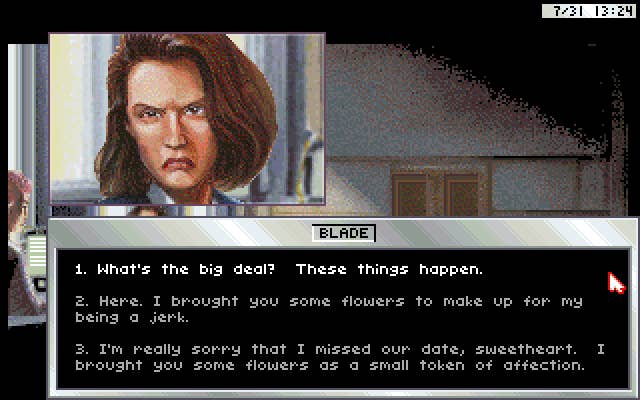
The game also featured some really quite dreadful "arcade" sequences to depict the story's more "action movie" moments, but to Dynamix's credit, they did make these sequences completely optional and unnecessary to progress, meaning that anyone could make it to the end of the game, regardless of their own twitch abilities.
How to play it now: Good luck; this is one of the few adventures of the early '90s that hasn't yet been rereleased for modern systems via Steam or GOG.com. You'll need to track down either an old DOS version and run it through DOSbox or the enhanced (albeit censored and graphically inferior) Sega CD version to play it today.
Indiana Jones and the Fate of Atlantis
Part of LucasArts' "golden age," Indiana Jones and the Fate of Atlantis is one of the best licensed games of all time. The reason it's so good, particularly in the much-derided field of licensed games, is that it doesn't attempt to recreate an existing work -- instead, it works with established characters to tell an all-original tale that would have made a great Indy movie in its own right. Certainly better than Crystal Skull, anyway.
In Fate of Atlantis, you'll take control of Indy and his sidekick Sophia Hapgood (who was, I'm not at all ashamed to admit, my first videogame crush in all her pixelated glory) as they attempt to uncover the truth behind the mythical lost city of Atlantis. All your usual Indy moments are present and correct -- fistfights against the Nazis, exploration of ancient archeological digsites, an element of the supernatural -- and the relationship between Indy and Sophia is handled in the manner you'd expect from an Indy movie.
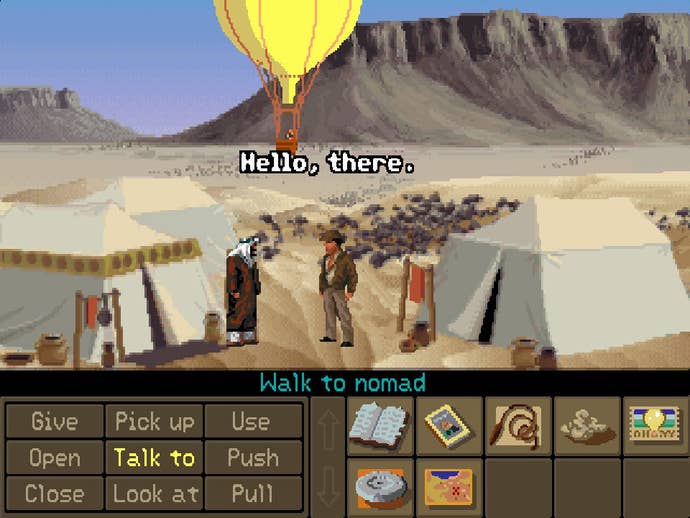
Fate of Atlantis was also noteworthy for having three completely different paths through the middle section of the game depending on whether you indicated you'd prefer to think, fight or cooperate your way through. Which option was "suggested" to you was determined by your actions in the first third of the game, but you were free to pursue any, and each playthrough also featured lightly randomized elements so things were never quite identical.
Although looking and sounding quite dated now -- the voice acting in particular has not aged at all well -- Fate of Atlantis remains a benchmark for the adventure game genre in terms of excellent puzzle design and interactive storytelling, and is still just as worth playing today as it was on its original release.
How to play it now: It's on Steam for $4.99, or $9.99 as part of a bundle with some other LucasArts classics. No excuses!
Gabriel Knight: Sins of the Fathers
Arguably the finest of all Sierra's adventures, Gabriel Knight: Sins of the Fathers is the work of Jane Jensen, who is still making adventure games today. It's an interesting tale, combining elements of noir detective fiction and supernatural horror to create something altogether unlike anything that had been seen prior to that point -- and since, for that matter.
In one of the strangest casting choices of all time, Tim Curry plays Gabriel Knight, the lazy, womanizing owner of St. George's Books in the French Quarter of New Orleans. Ably assisted by his capable but long-suffering assistant Grace, Gabriel finds himself embroiled in the mystery of the "Voodoo Murders," a string of atrocities in New Orleans that appear to have something to do with traditional Voodoo practices. What follows is a lengthy, challenging investigation with all the twists and turns you'd expect from a good mystery novel, coupled with some truly excellent characterization.
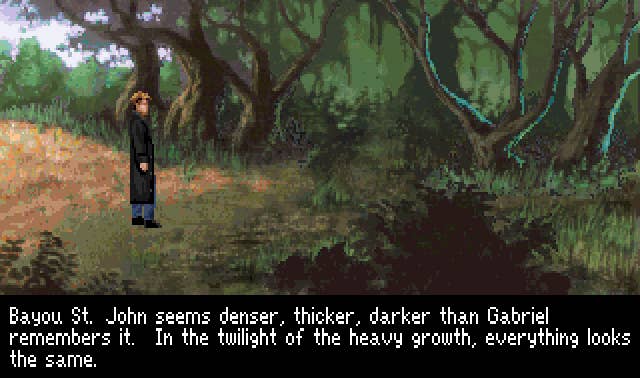
Sins of the Fathers was followed up by the FMV-based The Beast Within and the polygonal 3D Blood of the Sacred, Blood of the Damned, both of which are worth your time, but Sins of the Fathers remains the series' high point.
How to play it now: All three Gabriel Knight games are available on GOG.com. Jane Jensen is also working on a complete remake of Sins of the Fathers to mark the series' 20th anniversary, though this will sadly no longer feature the dulcet tones of Curry in the title role.
King's Quest VI
One of Sierra's longest-running series throughout its life as an adventure game specialist was the fairy tale-inspired King's Quest, of which its sixth installment was undoubtedly its finest hour.
Taking on the role of Prince Alexander as he attempts to rescue Princess Cassima from the clutches of the evil vizier Abdul Alhazred, the game sees you exploring the fictional Land of the Green Isles and encountering numerous elements from a variety of different mythoi. The central Isle of the Crown was based on the Arabian Nights stories, for example, while other isles had influences ranging from Alice in Wonderland to classical mythology. The overall tale was beautifully crafted, weaving an original story around these diverse influences to produce a true modern-day fairy tale.
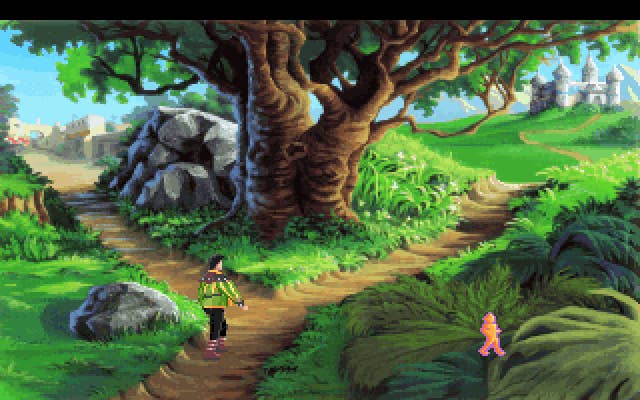
The game was noteworthy for having multiple endings -- you could either take the quick and easy route to the finish, or take a longer, more involved route that resulted in a more satisfying ending. Numerous choices made along the way also affected the ending, giving the game a surprising amount of replay value -- quite unusual for the genre.
How to play it now: Grab it in a bundle with its two prequels from GOG.com for $9.99.
The Dig
The Dig is from the later era of LucasArts adventure games, and the early days of the CD-ROM age. It remains one of the more spectacular, intriguing games of the time, and is still well worth playing today.
Taking on the role of Commander Boston Low and his crew, the game is an old-school sci-fi adventure in which Low and the gang are sent out to divert the course of an asteroid headed for Earth. Through an unfortunate series of events, Low and co. find themselves transported to a strange alien world, and must subsequently unravel its mysteries in an attempt to make it home.
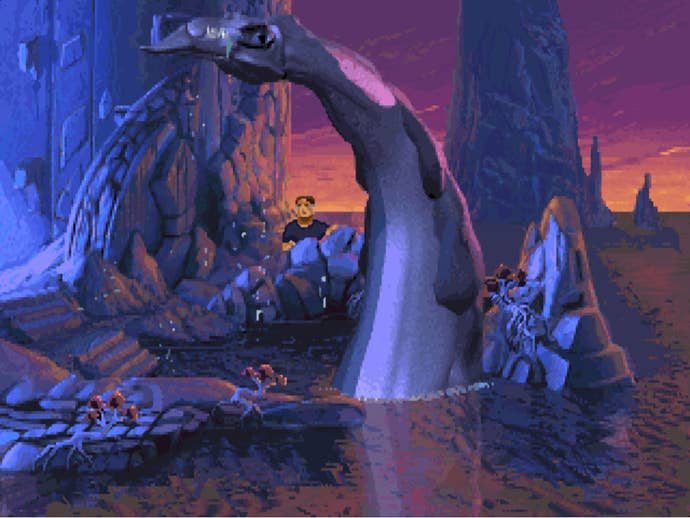
The Dig had some serious sci-fi credentials. Originally intended as an episode of Steven Spielberg's Amazing Stories, it was subsequently adapted to the interactive medium by interactive fiction author Brian Moriarty and Spielberg himself, with dialogue written by Orson Scott Card. And to cap off this sci-fi dream team, Industrial Light and Magic was responsible for a number of the impressive visual effects throughout the adventure.
As impressive as its team's pedigree is, The Dig is noteworthy simply for being a great adventure game. It has an unusual setting and plot, some great characters and a profoundly affecting, bleak atmosphere. Most of all, though, it's one of the few entries in the adventure game genre that truly feels like you're going on a real, you know, adventure into the unknown.
How to play it now: It's on Steam, either by itself or as part of the same bundle with Fate of Atlantis.
Grim Fandango
Regarded by many as one of Tim Schafer's finest creations, Grim Fandango is also seen by many as one of the last gasps of adventure gaming's "golden age."
This wonderfully creative game, inspired by the Mexican Day of the Dead celebrations, casts players in the role of Manny Calavera, a skeletal figure living in the Land of the Dead attempting to atone for past sins and find eternal rest. In true film noir tradition, it isn't long before a mysterious woman enters the picture, and much of the story revolves around Manny's four-year journey to track down the enigmatic Mercedes and discover a few uncomfortable truths in the process.
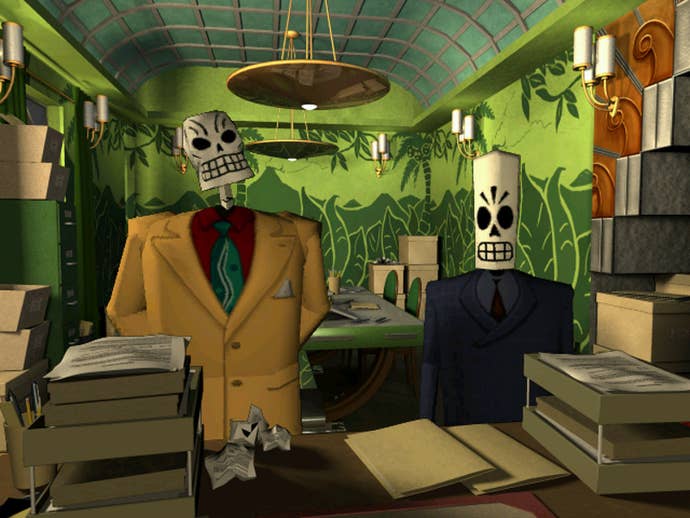
Grim Fandango was unusual among adventure games at the time for eschewing the usual point and click mouse-driven interface in favor of Resident Evil-style tank controls and hotkeys to interact with the environment. The control scheme wasn't altogether successful, being unnecessarily clunky at times, but it's a minor blemish on an otherwise beautifully produced game that is by turns hilarious, touching and tragic, and one of the finest adventure games ever created.
How to play it now: Unfortunately, Grim Fandango is another classic adventure game that hasn't been modernized for up-to-date systems. As such, you'll need to track down some original CDs to play it legally -- and perhaps jump through a few hoops to get it running stably on modern operating systems. It's worth the hassle, though.
The Longest Journey
One of renowned developer Ragnar Tørnquist's finest works, Funcom's The Longest Journey is an astonishingly good adventure game that combines mature, intelligent writing with believable characters and a wonderfully imaginative premise.
Taking on the role of April Ryan, the adventure revolves around the relationship between the colorful fantasy world of Arcadia and the futuristic dystopian realm of Stark. Ryan discovers early in the game that she is a "Shifter" able to move back and forth between these worlds, and thus begins a lengthy adventure in which she is tasked with restoring the mysterious "balance" between the two worlds.
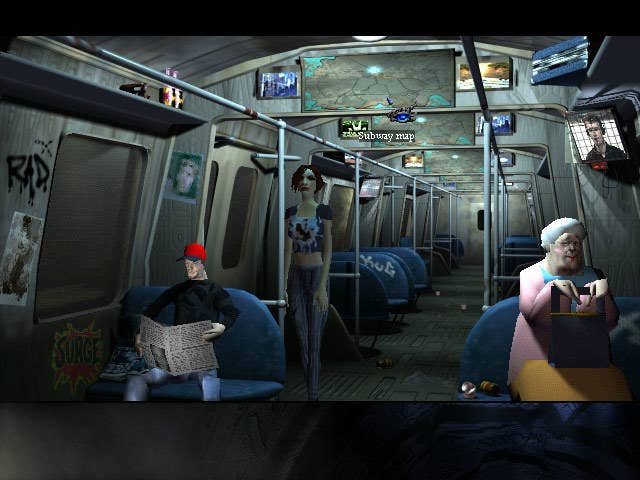
The two disparate settings are both beautifully crafted and distinct from one another; the vibrant color palette of the Arcadia scenes is the antithesis of the dreary perpetual gloom of Stark, and the characters in both settings reflect the world they inhabit very well. Ryan herself is a great protagonist, too; she's a strong, self-sufficient woman who is not dependent on the support of others, and her personal growth over the course of the story (and, indeed, the sequel Dreamfall: The Longest Journey) is a delight to witness.
How to play it now: It's available on both Steam and GOG.com. Its sequel Dreamfall, while not quite as good a game, is also worth checking out for the continuation of the story, and Tørnquist is presently working on a second sequel in the form of the crowdfunded Dreamfall Chapters.
Broken Sword
Criticized by some on its original release for being heavy on the dialogue and lighter on the puzzle-solving than some of its contemporaries, the Broken Sword series has since been recognized as one of the best adventure game franchises out there, even with its slightly jarring forays into full 3D for its third and fourth installments.
The Broken Sword series tells the tale of the brilliantly mundane protagonist George Stobbart (who, at various points in the series chronology works as a lawyer, a patent officer and an insurance assessor) and his will they-won't they female companion, French journalist Nico Collard. Over the course of the five games in the series to date, they investigate a variety of mysteries based on popular mythology, primarily centering around the Templars, and come to terms with both conspiracies dating back to ancient times and supernatural elements.
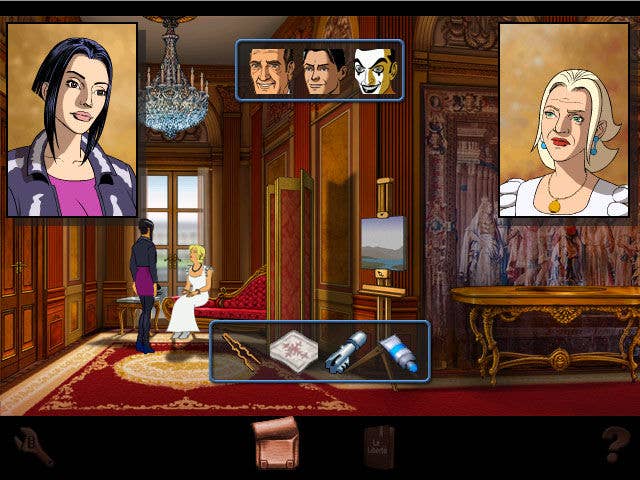
Although the games' stories are enjoyable in a Dan Brown sort of way -- the first game predates The Da Vinci Code by some seven years and has been suggested by some to have been a strong influence on Brown's work -- the main reason to play through the Broken Sword games is the well-written dialogue and character interaction. George, while initially putting across the impression of being a fairly generic character with a dull occupation, quickly shows himself to be in possession of a very dry wit and strong affinity for withering sarcasm, while Nico's forthright, occasionally short-tempered nature means she complements George well. Over the course of the games, both protagonists get into a variety of strange and memorable situations, and their turbulent on-off relationship with one another is an enjoyable common thread between the various installments.
How to play it now: The first three Broken Sword games and the first part of the new fifth installment are available on Steam; all five games are available on GOG.com. Sadly there's no sign at the time of writing of the second part of Broken Sword 5; given that the currently available first part ends on a somewhat frustrating cliffhanger, you may want to use the time to catch up on the earlier installments first.
Ben There, Dan That!
The work of independent British developer Size Five Games, Ben There, Dan That! and its sequel Time Gentlemen, Please! are both love letters to the golden age of adventure gaming, combining enjoyably silly but coherent stories with authentically fiendish puzzles, some well-crafted parodies of classic, iconic adventure games and a very healthy dose of distinctively British humor.

The first adventure Ben There, Dan That! casts players in the role of Dan and Ben, a pair of self-deprecating authorial self-inserts for developers Dan Marshall and Ben Ward, and a pair of hapless heroes thrown into a situation beyond their control and, to a certain extent, understanding. The enjoyably endearing tale chronicles their accidental transportation to an alien spacecraft after failing to build a home-made aerial with which to watch a Magnum P.I. marathon on TV, and their subsequent attempts to escape across a series of what appears to be parallel worlds.
The second installment Time Gentlemen, Please!, meanwhile, continues their ridiculous adventures, this time with a strong focus on time travel. To explain too much more would be to give away the hilarious plot twists along the way, but suffice to say both games are memorable, enjoyable, laugh-out-loud funny and well worth your time.
How to play it now: Both games are available in a bundle on Steam.
Cognition: An Erica Reed Thriller
This four-part Kickstarter-funded episodic series spins a dark, enjoyable tale with an interesting main character. Legendary adventure game writer Jane Jensen was involved with the project as a story consultant, and it shows; there's strong Gabriel Knight-style undertones in the way the characters interact with one another, the careful blend of modern realism and fantastic supernatural elements, and the complex, flawed protagonist Reed.

The episodic format is used well to split the overall story of Reed investigating her brother's death into four discrete but related cases, each of which sees her developing her supernatural psionic powers. Over the course of the four games, Reed will be able to witness events that transpired in the past simply by touching objects, help witnesses recover their memories by reassembling images from clues and numerous other techniques that you'd think would give an FBI agent a distinctly unfair advantage. Even with her abilities, though, the four cases present a stiff challenge for even the most dedicated adventure game veterans -- and a pleasantly mature, affecting story that doesn't resort to too much in the way of outright grittiness or gore to get its tone across.
While buggy in a few places, Cognition is strong evidence that developer Phoenix Online Studios very much has its heart in the right place when it comes to adventure game development -- and makes its future projects something adventure fans will almost certainly want to keep an eye on.
How to play it now: All four episodes are available via GOG.com, Steam and numerous other storefronts around the Web.
One to Watch: Moebius
As a new title from Jane Jensen -- who worked on King's Quest VI, Gabriel Knight and Cognition from the list above -- Moebius is a new title that adventure game enthusiasts should be keeping a close eye on.
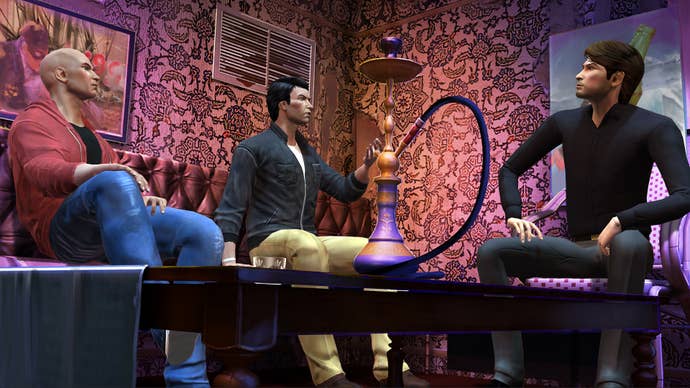
The first title from Jensen's Kickstarter-funded Pinkerton Road Studio, Moebius is a full-length (rather than episodic) adventure game that casts players in the role of the wonderfully-named antiquities expert Malachi Rector.
Rector is recruited by the US government to look into a murder in Venice, and unsurprisingly the appointment brings with it a number of questions. Why was he chosen? Why does he feel like he knows Special Forces operative David Walker? And why do people keep trying to kill him?
Moebius is out on April 15; you can preorder it on Steam for 20% off its usual price right now. Watch out for a full review from USG around the release date.
